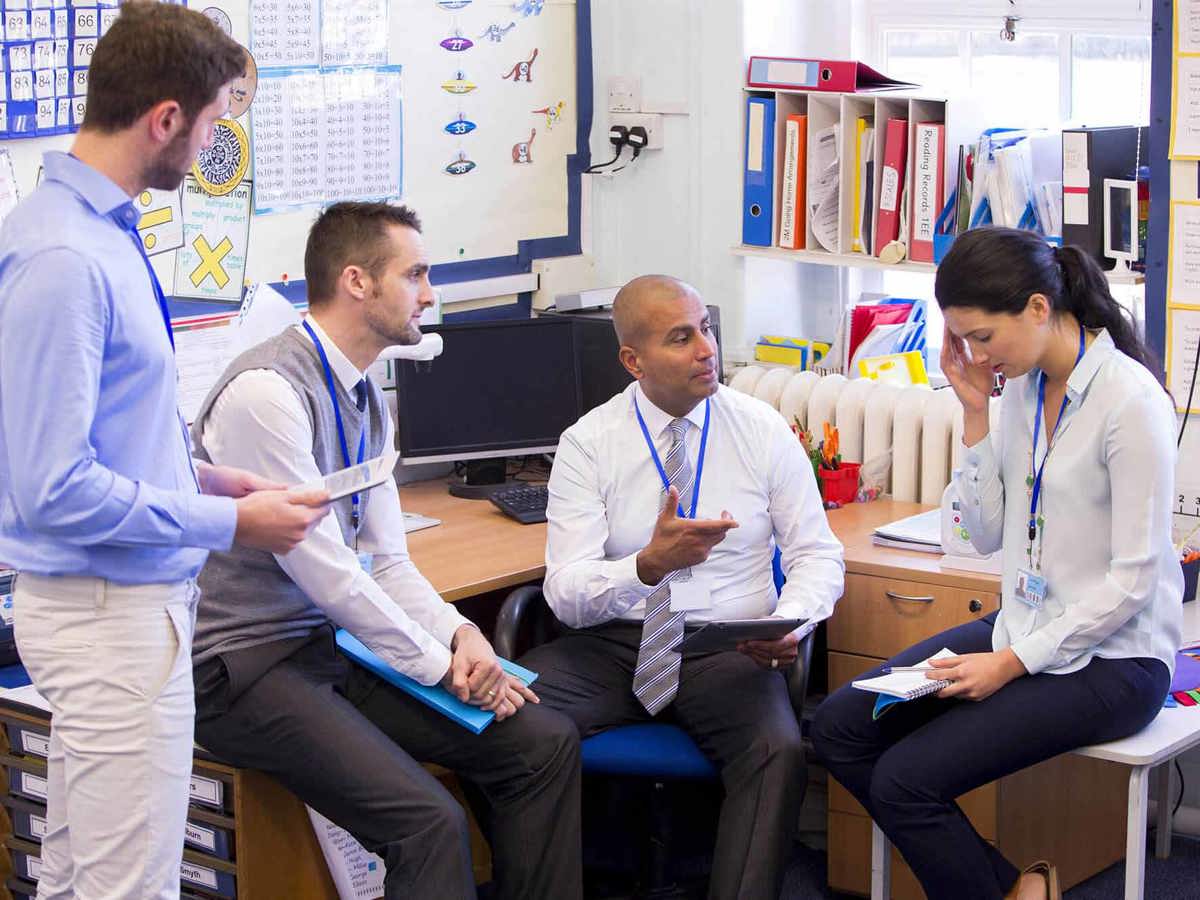Empowering leadership: safeguarding headteachers' wellbeing
School leaders are the driving force behind school improvement, innovation, and pupil success.

As the frontline leaders responsible for steering their institutions through challenges and triumphs, headteachers bear a significant burden. This on its own, even in the best of times, is an enormous ask, that carries with it an emotional and mental toll.
Any leader from any profession will know that leadership demands big things from your brain, from your resilience, and from your emotional reserves. But those reserves can deplete quickly in any number of stressful leadership situations. Perhaps one that has gathered more attention in recent times than anything else, is the emotional toll of being a school leader as a school faces inspection.
We have all seen the terribly sad ongoing stories of the impact inspection can have. The last year has been a stark reminder that sometimes, high stakes accountability comes at too great a cost. This simply is not right, and many of you have shared directly with us over the last year or so the breaking points your leaders have reached or almost reached as they withstood, through gritted teeth, the anticipation of either looming or the commencement of probing eyes through the lens of the education inspection framework. This has been vividly reported by HeadsUp and we are holding a joint forum with them this term to further explore these issues: please do join us if you can.
Before I go any further, let me first pause and make something clear: NGA (National Governance Association) is not anti-inspection. We take much care to base our positions and evidence on the views and experiences of governors and trustees. Changes are needed.
A few weeks ago, as I and NGA’s co-CEO, Emma Knights met with Sir Martyn Oliver, His Majesty’s Chief Inspector, we discussed in detail the vital role of governance in inspection. The bulk of that conversation related to the wellbeing of leaders facing and during inspection. Ofsted is now working with inspectors to ensure that the wellbeing of leaders is thoughtfully considered.
We also want to make sure that boards, chiefly the chair, can be better equipped to provide a supportive safety net, both before the inspection begins, if it ever gets too much, and after the inspection has ended and the judgement has been cast.
Recognising the critical importance of headteachers' wellbeing in maintaining a healthy and thriving school environment, and offering support ahead of, during and after inspection, is where governing boards provide a level of support, care and reassurance that really no one else can.
Ofsted recently announced the updates to its policy for deferral and pause of inspection, and additional evidence gathering. These mechanisms exist as safeguards for, yes, a legitimate sense of accountability and accurate judgements, but also safeguards for the wellbeing of leaders given the indisputable pressures inspections bring. We have put together an information sheet explaining these updates, including the differences between deferral – delaying an inspection before it has begun, and pausing – putting a usually short term stop to an inspection already in flow.
What is very clear in both scenarios, particularly where an inspection is paused, is that the governing board’s duty of care for the headteacher includes the chair, on behalf of the board, knowing when enough is enough.
The balance of challenge and support long-debated in the world of school governance. Too much challenge, and you are an adversary, too much support, you are a fan club. When it comes to the topic of inspection, achieving the balance becomes even trickier – you may have a crucial judgement call to make.
I am very fond of the saying Emma Knights introduced:
Boards monitor, support and challenge, they get to know their schools’ strengths and weaknesses very well. It is highly unlikely that in one visit the inspectorate can learn things boards and school leaders do not already know. Governing boards need to have confidence in the decisions they collectively make, while convincing leaders who are working hard to deliver the strategy that there is no need to fear the consequences of an inspection.
So what does this mean?
1. Joint preparation and planning
Governing boards, and chairs in particular want to feel confident ahead of inspection, that they know both how the school's leadership are feeling about it, and if any action is needed to support leaders' wellbeing ahead of getting the call. Let's be clear – this is not so much about being inspection ready – it is simply about being assured that the organisation is in confident hands.
While we have spent years trying to convince people that Ofsted is nothing to fear, we do realise the long-term culture around Ofsted; the anticipation of an Ofsted inspection can and does evoke feelings of anxiety and stress for headteachers. Chairs and governing boards can alleviate these pressures simply by ensuring that the leadership is feeling ok, is well-prepared and equipped to showcase its strengths. If you are confident in the school's self-evaluation, you will also know what the areas for improvement are and be able to pre-empt conversations with inspectors by telling them what plans are in place to improve.
By collaborating with headteachers and SLT to develop a culture where it is okay to be honest about anxieties related to inspection, this provides access to a new level of transparency and trust. Yes, relevant resources and training can help, guidance on navigating the inspection framework, but boards can truly empower headteachers to approach the process with confidence and clarity by simply using the broken record technique of reminding them “we are with you”, repeatedly.
For schools that are part of a MAT, make sure inspectors understand how governance functions are delegated – this should be made clear in your trust’s scheme of delegation.
2. Clear communication and expectations of confidence
Open and transparent communication across the organisation is essential in fostering a supportive relationship between not just the governing boards and headteachers, but also in utilising the power of governance to effect organisational wide culture. Boards should be asking not just how does leadership feel about inspection, but how do staff feel? If Ofsted are frequently referred to as the enemy, why is this? Chances are, it is a message that is cascading from the top down. The board can change this. Prior to an Ofsted inspection, boards should clearly communicate yes, their expectations but offer assurance to all staff that they have been working with the leaders and are confident in the self-assessment of where the school currently is situated. If the reality is the head and the board determine that the school is heading for an RI, then the board should talk to the leadership about how this is appropriately communicated and conduct rationalised thinking-through of strategies to avoid any ‘jumping of the ship’. Simply standing behind the leadership team and showing that across the organisation is a very powerful thing to do. By reaffirming their trust in the headteacher's capabilities and commitment to the school's success, boards instil a sense of confidence and security that enables headteachers to focus on leading effectively during the inspection.
3. One to one emotional support and encouragement
Regardless of how confident you are, or how much work the board has done to instil confidence in the leadership, headteachers may experience heightened pressure to perform and deliver results as inspections beckon or begin. Governing boards and chairs can give much-needed emotional support by offering encouragement before, during and after. After the phone has rung from Ofsted – are you confident your head will first be on the phone to you and will give you an honest account of their thoughts and feelings in that moment? At this moment in time, it is vital that chairs and board members are not instigating or buying into any panic, but instil an atmosphere of calm confidence. Maybe even going over the likely or unlikely scenarios – it might sound silly, but have you ever told your head that a downgrading from outstanding to good is not going to result in them being sacked? We know that some heads fear the worst, so by expressing appreciation for the headteacher's dedication in that moment, you can remind them of their value to the school community. Simple gestures such as words of encouragement, expressions of gratitude, and acts of kindness can have a profound impact on bolstering morale and resilience.
4. Advocacy, representation and support
During the inspection itself, governing boards serve as advocates for the school and its leadership team. First and foremost, chairs and other board members involved need to be aware of how the head is feeling during the inspection. Wherever possible, the chair will attend the meeting with inspectors. Of course, another board member such as vice chair may need to step in if work or other commitments don’t allow for this. Be sure to get the full picture – has there been any minor or major disruptions to routine day to day practice leading up to the inspection? How has this impacted the ability of the head to be confident both in who they are and in what the organisation is? Boards should be prepared to engage with Ofsted inspectors if they are concerned about the wellbeing of the head – if for example, the head is emotionally or mentally being placed in a worsening situation, are you familiar with the pause policy? Is it time to speak to inspectors about it?
5. Ask to attend the final team meeting with the head
This is the meeting at the end of the inspection, where the inspection team is compiling its judgement with senior leaders – or at the very least the headteacher. Ask to join that meeting to observe – as well as understanding more about the inspection and their view of what they have seen, you will be able to observe the headteacher’s reaction and response. You can have a conversation with them before the final feedback meeting with the whole board or as many as can attend.
Governing boards have too often been overlooked in the national conversation on the debate on inspection, but they play one of the most vital roles of all – in assuring the safeguarding and wellbeing of headteachers before, during, and after Ofsted inspections. Support, reassurance, and advocacy are incredibly powerful things – like me, many of you know just how much difference a good, caring boss can have on your ability to shine and be confident. You can empower headteachers to not just navigate the challenges of the inspection process, but perhaps, even to enjoy the experience, or if that is a step too far, to walk through it with confidence and resilience.

Deputy Chief Executive
Sam oversees NGA’s policy, communications and research services, supporting NGA to achieve positive change in the policy of school governance. He is the policy lead for NGA’s work on the governance of multi academy trusts.
Share your views on Ofsted's work
Sir Martyn Oliver, His Majesty’s Chief Inspector at Ofsted, encourages governors and trustees to provide feedback on the areas of Osted's work that matter most to you. Watch the video below to find out more and share your views now by completing the Big Listen survey.




























